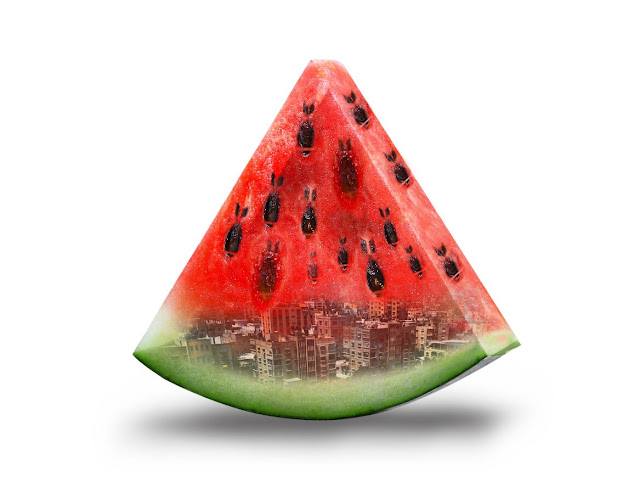It all came to light recently when the New York City chapter of the Democratic Socialists of America posted a flier targeting Rep. Hakeem Jeffries, D-N.Y., and calling for a ceasefire in Gaza. The flier featured a drawing of a watermelon with the message: “Make art outside Hakeem Jeffries’ Office.” The flier of a watermelon aimed at a Black lawmaker angered some in the Black community, and understandably so.
Black folks have a love-hate relationship with watermelon. Many of us love to eat the sweet and juicy fruit, but drawings and depictions of watermelon trigger us and make us feel some sort of way. Why is that? This wasn’t always the case.
Black people take offense to the watermelon imagery because of the role watermelon has played in our own racialized oppression, particularly since after the Civil War. Watermelon dates back to Africa, and while the racist imagery linking Black people with watermelons was present during enslavement, watermelon was first associated with Arab and Italian peasants in the early 19th century. In America, watermelons were a symbol of Black freedom and self-sufficiency when the formerly enslaved grew and sold them after emancipation. For the white supremacist power structure, this was a threat to the racial order and white power.
During Jim Crow, white people amplified the watermelon as a cartoonish symbol of Black denigration, inferiority, laziness, childishness, uncleanliness and other racial stereotypes. Watermelon became a white supremacist trope and epithet, a toxic representation of blackness that far too many Black people have internalized. A healthy fruit associated with Black freedom was weaponized to damage the Black psyche.
As the Jim Crow Museum at Ferris State University has chronicled, the grotesque imagery promoted by white Jim Crow society of caricatured Black faces with googly eyes and dark skin, bright red lips and tattered clothes eating watermelons took its toll on the self-esteem of Black people.
Newspapers and postcards during the Jim Crow era promoted caricatures of
watermelon-eating Black people, associating the fruit with free Black people. Films such as “The Birth of a Nation” and the animated “Scrub Me Mama with a Boogie Beat” featured Black people eating watermelon and helped to amplify and solidify these stereotypes in the white consciousness. These denigrating images meant to embarrass Black people and make them look silly, stupid, messy and carefree are a reason why some Black people refuse to eat watermelons to this day — and in front of white people.Even in the present-day media landscape and popular culture, the damaging watermelon imagery continues, and Black folks can’t seem to shake it off.
A symbol of Jim Crow for Black people in the United States, the watermelon assumed a different, powerful symbolism for Palestinians living under the apartheid military occupation of Israel. When Israel seized control of the West Bank and Gaza in 1967 and criminalized displaying the red, black, green and white Palestinian flag, Palestinians adopted the watermelon as a workaround (as a point of reference, the Black nationalist flag is red, black and green).
The flag ban was lifted in 1993, but the watermelon remained a potent icon of Palestinian solidarity. Plus, Israeli police will still snatch a Palestinian flag and make arrests. And pro-Palestinian users even adopted the watermelon emoji to overcome what they believe are content restrictions on social media.
Watermelon symbolism reflects the struggles for freedom and fights against oppression for African-Americans and Palestinians. Today, that symbolism lands quite differently for Black people in America and for Palestinians living under Israeli occupation. Jim Crow America weaponized the watermelon against Black people as a backlash against emancipation and Black empowerment. Palestinians adopted the watermelon as a symbol of empowerment and solidarity. But we must acknowledge these differences and hold both realities at the same time.
This article originally appeared at LAProgressive.org on December 13th, 2023.
See below for our Related Posts
While Israeli Media Examine Government Failure, US Papers Push ‘National Unity’ , FAIR
Pro-Israel PACs poised to spend big to unseat progressive members of Congress in 2024 election cycle, Open Secrets
300,000 march in Washington, DC for Palestine, Peoples' Dispatch
University students across the US walk out of classes for Gaza, Peoples' Dispatch
Group of FL Republicans want D.C. mayor to remove Black Lives Matter mural, Florida Phoenix
Palestinian resistance in Gaza launches historic surprise attack against Israel, Peoples' Dispatch
Please support the news you can use and visit The Brooks Blackboard's website, for more news and share our posts!
And read my brief bio about my writing life
On social media, visit me on
Facebook: The Brooks Blackboard
Twitter: @_CharlesBrooks




No comments:
Post a Comment